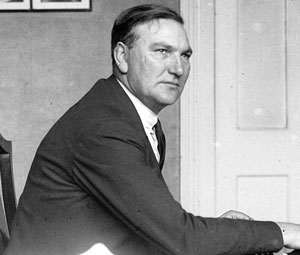By Joseph E.A. Connell Jr

Joe McGrath was born in Dublin in 1888. By 1916 he was working with his brother George at Craig Gardiner and Co., a firm of accountants in Dublin. He worked with Michael Collins, a part-time fellow clerk, and the two struck up a friendship. In his spare time McGrath worked as secretary for the Volunteers’ Dependants’ Fund. He soon joined the IRB.
In October 1921 he travelled with the Irish delegation to London as a member of Collins’s personal staff. When the Provisional Government was set up in January 1922, McGrath was appointed as minister for labour. In the Civil War he took the pro-Treaty side and was made the National Army’s director of intelligence, replacing Liam Tobin.
He was later put in charge of the Criminal Investigation Department (CID). It was modelled on the London Metropolitan Police department of the same name, but was accused of the torture and extra-judicial killing of a number of anti-Treaty prisoners during the Civil War.
As well as the labour ministry, McGrath also later held the industry and commerce portfolio. In September 1922 he used strike-breakers to oppose trade unionists in the Post Office service, despite having threatened to resign the previous March when the Provisional Government proposed to use British strike-breakers. In December 1922 McGrath was a reluctant supporter of the government’s decision to execute four high-profile IRA prisoners—Liam Mellows, Joe McKelvey, Rory O’Connor and Dick Barrett.
McGrath resigned in April 1924, dissatisfied with the government’s attitude to the Army Mutiny—‘government by a clique and by the officialdom of the old regime’. By this he meant that former IRA fighters were being overlooked and that republican goals had been sidelined. McGrath and eight other TDs left Cumann na nGaedheal, resigned their seats in the Dáil and formed a new political party, the National Party. This triggered simultaneous by-elections in March 1925, described as a ‘mini-general election’, as a test of public opinion and sympathy with the mutiny. The nine TDs protested the refusal of the government to reinstate mutineers among the officer corps in October 1924. They were also impatient with progress towards a united 32-county republic. The new party did not, however, contest the subsequent by-elections for their old seats. Seven of the polls were won by Cumann na nGaedheal, the other two by the abstentionist candidates of Sinn Féin, then still led by Éamon de Valera. The National Party was a minor political party between 1924 and 1925, and it was considered a splinter group of Cumann na nGaedheal.
Following his political career, McGrath went on to become involved in the building trade. In 1925 he became labour adviser to Siemens–Schuchert, German contractors for the Shannon scheme. McGrath founded the Irish Hospital Sweepstakes in 1930, and its success made him an extremely wealthy man. He had other extensive and successful business interests and became Ireland’s best-known racehorse owner and breeder.
He died on 26 March 1966.
Joseph E.A. Connell Jr is the author of The Terror War: the uncomfortable truths of the Irish War of Independence (Eastwood Books, 2022).
